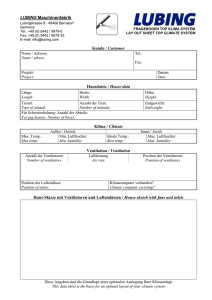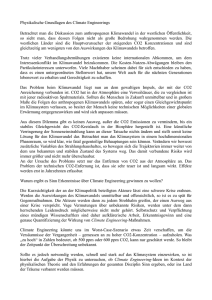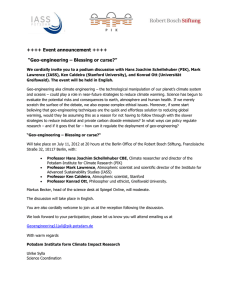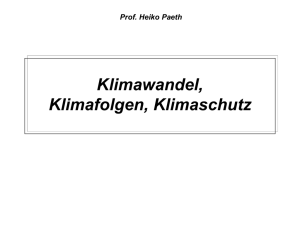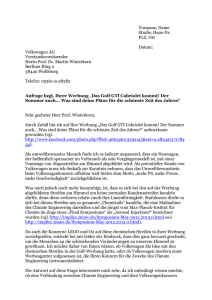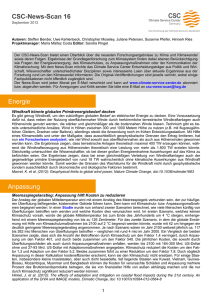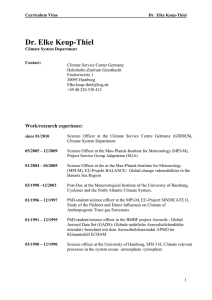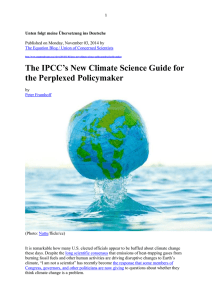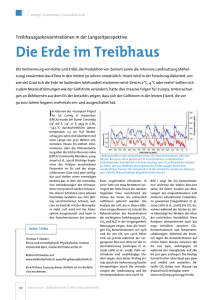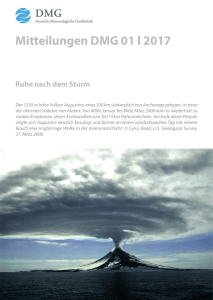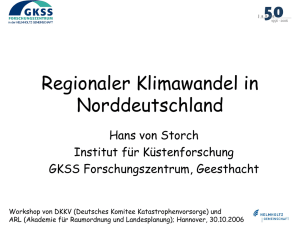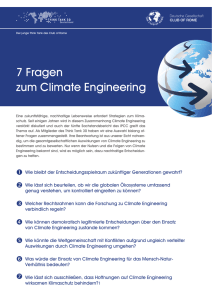EPP hearing on "Key Issues in Post-Copenhagen
Werbung
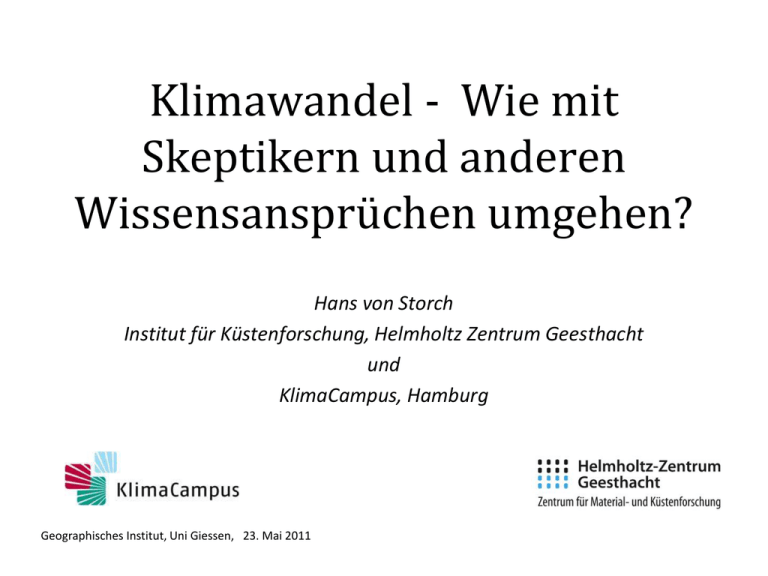
Klimawandel - Wie mit Skeptikern und anderen Wissensansprüchen umgehen? Hans von Storch Institut für Küstenforschung, Helmholtz Zentrum Geesthacht und KlimaCampus, Hamburg Geographisches Institut, Uni Giessen, 23. Mai 2011 Entwicklung der global gemittelten Lufttemperatur – aus Thermometerdaten abgeleitet Dekonstruktion der Entwicklung der Lufttemperatur Only natural factors Additional ly manmade factors „observations“ IPCC 2007 Szenarien – mögliche Zukünfte, aber keine Vorhersagen Mission: Darstellung des gegenwärtigen Wissens und der Kovergenz dieses Wissen – und nicht etwa das Finden der ”Wahrheit” über den Klimawandel Intergovernmental Panel on Climate Change - Wird benötigt als unparteiischer „Lieferant“ von relevantem Wissens für Entscheider - Hat eine starke Beweise dokumentiert, dass die globalen Lufttemperaturen angewachsen sind, die nicht auf rein natürlicher Vorgänge zurückgeführt werden können. - Die gefundene Erwärmung kann mit gegenwärtigem Wissen nicht ohne das Wirken von Treibhausgasen erklärt werden. Daher ist mit einer Fortsetzung der Erwärmung zu errechnen. Das „lineare Modell“ – ein Konzept zum Umgang mit der Entwicklung von Klimapolitik. (Hasselmann, 1990) November 2009 March 2010 Zwei Konstruktionen des „Klimawandels“ – eine wissenschaftliche, eine kulturelle – welche ist wirkmächtiger? Kuturell: „Klimakatastrophe“ Wissenschaftlich: Der menschgemachte Wandel ist real, kann beschränkt aber nicht ganz vermieden werden. Lund and Stockholm Storms Examples: media-reporting Wissenschaftler beraten die Öffentlichkeit Examples: media-reporting Knowledge market • The science-policy/public interaction is not an issue of the linear model of „knowledge speaks to power“. • The problem is not that the public is stupid or uneducated. • Science has failed to respond to legitimate public questions and has instead requested. “Trust us, we are scientists”. • The problem is that the scientific knowledge is confronted on the „explanation marked“ with other forms of knowledge (pre-scientific, outdated; traditional, morphed by different interests). Scientific knowledge does not necessarily “win” this competition. • The social process „science“ is influenced by these other knowledge forms. Which alternative knowledge claims? - skeptics - political interests (e.g., deniers, alarmists) - climatic determinism - religion - others Need of cultural sciences for scientific analysis of „climate“ Skeptics • • • • Who are they? What are skeptics skeptic about? How did they become skeptics? Non-representative survey on Klimazwiebel-blog done by Rob Maris with the help of Peter Heller Skeptics • There are highly visible personalities, which are unwilling to engage in an open dialogue, but are guided by preconceived politically based motifs. • On the other hand, there is a broad groundswell of skeptical attitudes among highly educated people, who - are irritated to see scientists drawing political conclusions, and - find themselves (and their questions) not taken seriously. • Debate takes place in the blogosphere. • Phenomenon does not disappear, neither by “educating” nor by insulting. • For overcoming the impasse, a dialogue needs to be established. • Also restraint on the side of the “oversellers” (alarmists) needed. • More research needed on the social phenomena of oversellers and skeptics. Schellnhuber on 2 deg goal SPIEGEL: Do you really believe that human civilization will collapse if the temperature rises by more than two degrees Celsius? Schellnhuber: Of course the world won't end if temperatures go up by 2.01 degrees, let alone end suddenly. From today's scientific perspective, we could possibly live with a warming of two to three degrees. SPIEGEL: Why then have you, as one of the creators of the two-degree target, imposed such a magical limit to which all countries must slavishly adhere? Schellnhuber: Politicians like to have clear targets, and a simple number is easier to handle than a complex temperature range. Besides, it was important to introduce a quantitative orientation in the first place, which the 1992 Framework Convention on Climate Change managed to elegantly wangle its way out of. And let's be honest: Even if we aim for the two-degree target, we'll end up somewhat higher. Whenever there's a speed limit, most drivers tend to go a little faster. Spiegel online, 08/17/2010 Distribution of civilizations in early 20th century (expert map) “Man lives in balance with his climate” Climatically determined „energy“ of people The crisis of climate science is not about the key scientific construct (man-made greenhouse gas emissions change climate towards warmer conditions) but a crisis of the trust into the societal institution “climate science”. Climate science has been unprepared with the challenges of post-normality, in particular to deal with the ongoing politicization of its utility and actors, and the scientization (de-politicization) of politics. Climate science needs to deal with skeptics and alarmists, most of whom are neither stupid or evil nor bought by special interests. Regional Climate service comprises … 1. Analysis of cultural construct, including common exaggeration in the media. - Determination of response options on the local and regional scale: mainly adaptation but also regional and local mitigation. - Dialogue of stakeholders and climate knowledge brokers in „Klimabureaus“. 2. Analysis of consensus on relevant issues (climate consensus reports). 3. Description of recent and present changes. - Projection of possible future changes, which are dynamically consistent and possible („scenarios“) 4. Direct exchange and discussion about climate science and climate policy with individuals via weblog. North German Climate Office@HZG An institution set up to enable communication between science and stakeholders • that is: making sure that science understands the questions and concerns of a variety of stakeholders • that is: making sure that the stakeholders understand the scientific assessments and their limits. Typical stakeholders: Coastal defense, agriculture, off-shore activities (energy), tourism, water management, fisheries, urban planning „Klimaatlas“ Raw data from 12 regional climate projections Analyzed for Northern Germany Interactive user interface climate consensus reports An effort to establish which scientifically legitimized knowledge about anthropogenic climate change is available for the Baltic Sea catchment. Approximately 80 scientist from 10 countries have documented and assessed the published knowledge. The assessment has been accepted by the intergovernmental HELCOM commission as a basis for its future deliberations. For 2013 the publication of a second assessment report (BACC II) is planned. The Climate Change Assessment: Report for the Baltic Sea catchment - BACC climate consensus reports In 2007-2010 a climate assessment report about the scientifically documented knowledge of climate change in the region of Hamburg has been prepared – an activity of the Climate Center of Excellence CLISAP at the University of Hamburg, jointly operated with HZG and MPI. The effort is supported by the Senate of Hamburg and by the Environmental Ministry of Schleswig Holstein. Climate assessment for the metropolitan region of Hamburg Beispiel: Nordeuropa Eine Hierarchie von globalen, regionalen Klimamodellen, und Wirkungsmodellen beschreibt im Detail den veränderliche Klimaeinfluss in der jüngeren Vergangenheit und in möglichen Zukünften Strömungsmodell der Nordsee Globale Entwicklung DynamischesDownscaling Pegel St. Pauli In Zusammenarbeit mit Ämtern, Behörden und Firmen Empirisches Downscaling www.coastdat.de Der CoastDat Datensatz: • Lange, hochauflösende Beschreibungen von vergangenen und derzeitigen Veränderungen in Nordeuropa (marine Gebiete; Land; seit 1948) – vor allem im Hinblick auf Stürme, Windverhältnisse, Seegang, Sturmfluten, Strömungen ; regionale Schadstoffstransporte. • Szenarien (100 Jahre) möglicher, klimatischer Bedingungen in Nordeuropa und Nord-und Ostsee. • Ausbau: ökologische Variablen; andere Gebiete, etwa Ost Asien und Laptev See. Kunden • Staatliche Stellen, insbesondere solche mit Verantwortung für Küstenschutz und regionalen Schiffsverkehr • Formen mit Interessen an Risiken (Schiffbau; offshore Aktivitäten) und Potentialen (Windenergie) • Allgemeine Öffentlichkeit / Medien: Deutung von Ereignissen; Darstellung von Perspektiven und Optionen Anwendungen von - Schiff-Design - Schiffs-Sicherheit - Off-shore Windenergie - Interpretation von Messungen - Ölunfälle und chronische Belastungen - Umweltverschmutzung - Ozeanische Energiequellen - Szenarien zukünftiger Seegangsbedingungen -Szenarien zukünftiger Sturmfluten Currents Power [W/m2] Wave Energy Flux [kW/m] „Take home“ • Klimawandel ist real, und verlangt unsere Aufmerksamkeit. • Wissenschaft spielt eine wesentliche beratende Rolle, nämlich - in der Bereitstellung von erforderlichem Wissen, um die komplexe Situation des Klimawandels in gesellschaftliche Kontexte einzuordnen - Randbedingungen für Maßnahmen zu klären (Zusammenhänge, Wirksamkeit) • Wissenschaft spielt diese Rolle glaubhaft, wenn sie ihre eigene Praxis dem Prinzip der eigenen Nachhaltigkeit unterwirft. „Take home“ • Klimawissenschaft operiert in einem „postnormalen Kontext“, in der die Grenzen zwischen Politik, Zivilgesellschaft und Wissenschaft verwischt werden. Politik wird so ent-politisiert (wissenschaftliche Erkenntnisse ersetzen politische Entscheidungen) und Wissenschaft ent-wissenschaftlicht (politische Wirksamkeit tritt neben wissenschaftliche Methodik). • Ein „Regionalen Klimaservice“ wird benötigt, u.a. um einen Dialog zwischen Öffentlichkeit und Wissenschaft aufzubauen – in Anerkennung der sozio-kulturellen Dynamik des Klimathemas. Take home • Alternative Wissensansprüche … - Anerkennung der Existenz und sozio-kulturellen Wirksamkeit; - Reflektion der Beschränktheit der eigenen Perspektiven durch “die” Klimawissenschaft; - Angebote der Falsifikation aller wissenschaftlichen Positionen; - Aufbau eines Dialogs mit der kritischen Öffentlichkeit; - Akzeptanz auch “dummer“ Fragen; - Aufgabe der umweltpolitischen Agitation durch Klimawissenschaftler.
